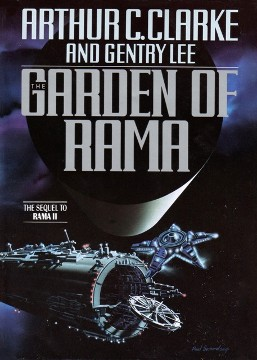That didn't take me very long to get through. I've been re-reading through the Rama series, and this is the furthest I've gotten.

My review of Rama II, and of the first book in the series are previously published on HIVE. This third book has a rather different tone, and it isn't the traditional Arthur C Clarke sense of wonder. It is a much more complicated story.
Arthur C. Clarke’s Garden of Rama is a story that lingers in the mind, not for its futuristic setting, but for the profound sadness it evoked in me. This isn’t a tale of interstellar adventure or technological marvels; instead, it’s a deeply, mundane, passionate and haunting exploration of what it means to be human.
Clarke doesn’t paint the given utopia as a shining city on a hill but rather as a fragile experiment in human nature, one that inevitably falls apart under the weight of the governing body and all of its myriad flaws.
The novel follows the community of humans sent to colonise the massive spaceship called Rama, in a settlement known as New Eden. They're basically hamsters in an experiment for some super-intelligent alien intelligence.
Rama is designed to journey to a distant star system. The colonists are a mix of optimists and realists, idealists and cynics, all striving to build a better world together. Yet, as the story unfolds, it becomes clear that even in this supposed paradise, humanity’s penchant for greed, selfishness, and shortsightedness threatens to unravel everything.
What sets Garden of Rama apart from the prior novels in this series is its focus on character drama. Each resident is flawed in ways both large and small - some are manipulative, others are passive, some are idealistic to a fault. Their relationships, both personal and political, are complex and often toxic.
The novel is also a meditation on the human condition. Clarke seems to argue that humanity’s greatest failure isn’t that we can’t achieve utopia but that we so often lose sight of what utopia truly means. The Rama colony of New Eden, initially designed as a noble endeavour to preserve knowledge and human life across vast distances, becomes a portrait of our collective inability to plan for the future. We build castles in the sand, convinced that tomorrow will always be better, but when the tide comes, they crumble.
One of the most poignant aspects of Garden of Rama is how it balances hope with despair. The characters cling to their beliefs, refusing to give in to the darkness, even as everything around them falls apart. It’s a story about what we choose to believe and the lengths we’re willing to go to protect that belief, particularly in its ending.
This isn’t science fiction in the traditional sense — it’s a deeply human story about politics, interpersonal relationships, and the weight of history. Clarke doesn’t just show us the possibilities of the future; he shows us the cracks in the foundation. (pardoning the reference and the Asimov pun)
It’s a story about failure—not of individual characters, but of humanity as a whole. And while it leaves you with a heavy heart, it also leaves you pondering whether utopia is even possible if we can’t learn from our mistakes.
So many parallels to the world of today, and so much depth that wasn't touched upon in the novel, but will perhaps be explored more in the final book in the series, which I will be starting to read shortly after publishing this review.
You left me wanting to explore that mix of hopelessness and humanity you describe. How interesting how Clarke dismantles utopia by showing our own contradictions, even if it sounds crude. The colonists as hamsters in a ship-labyrinth gives food for thought... Very good input!
Makes me think that we all might just be hamsters in a cosmic wheel :)
Reflecting on human failure is a rather complex subject, life is a roller coaster, you have to overcome obstacles, maintain emotional balance to continue in the best possible way. Quite a challenge. The main thing is to enjoy the reading.
Easy enough to do! Arthur C Clarke certainly doesn't make it hard to read his stuff. :)
Ends on a nice cliff hanger, the next one is full of sci-fi and even a bit of wizard of Oz.
Wheel of time is coming back for another season in March, have you read that series?
I have not. Next is gonna be the rest of Gibson's Neuromancer sequence.